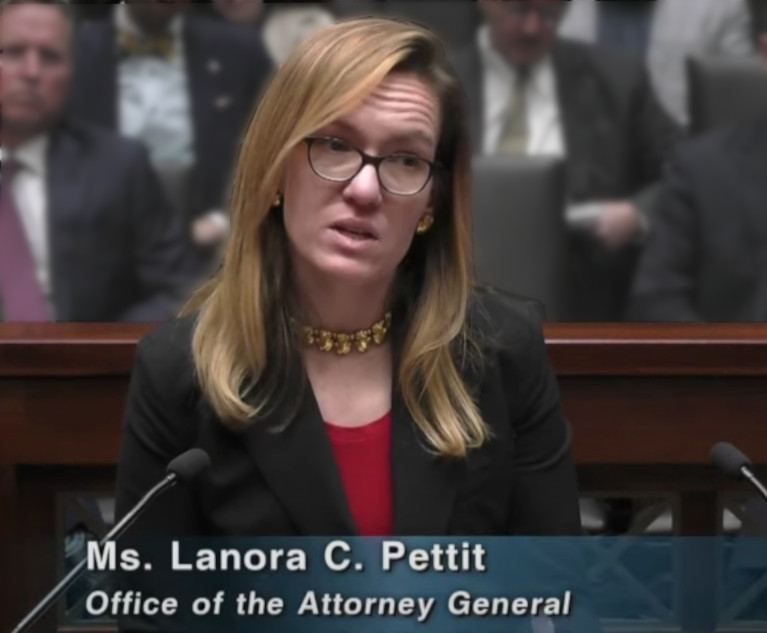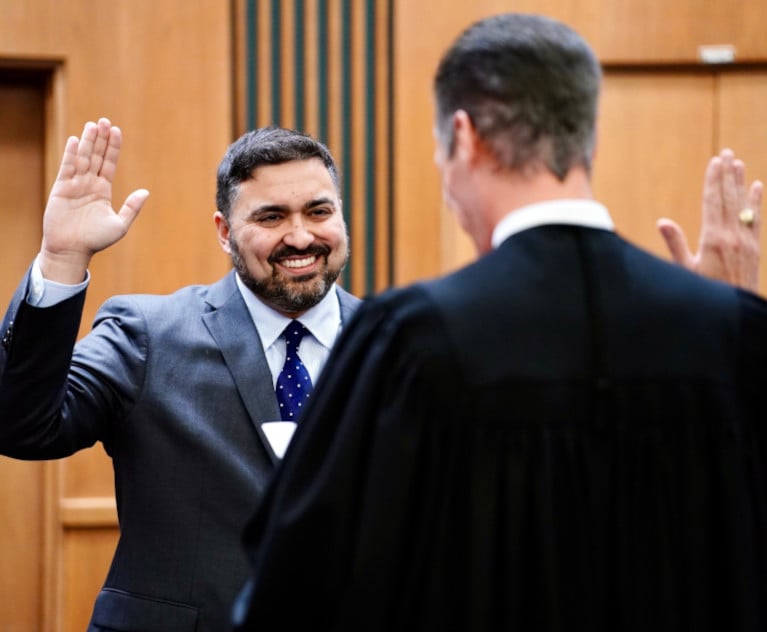Expecting a Case Backlog in Texas Courts? That's Not Happening ... Yet
Texas litigators who expected COVID-19 to grow court backlogs may be surprised to learn that Texas courts' clearance rates have actually improved during the pandemic. But it doesn't mean the Lone Star State's judiciary is in the clear.
July 01, 2020 at 12:16 PM
6 minute read
 Litigators who expect a traffic jam of a growing case backlog in Texas courts are wrong. Photo: Shutterstock
Litigators who expect a traffic jam of a growing case backlog in Texas courts are wrong. Photo: Shutterstock
Trial lawyers might expect to see a growing case backlog because of the way the COVID-19 pandemic has impacted Texas courts.
But they would be wrong—at least for now.
Case data from the Texas Office of Court Administration shows that—rather than a growing backlog—Texas courts have increased their clearance rates during the first three months of the pandemic.
Texas Lawyer analyzed data from March, April and May that comprised civil and family law cases in both district courts and county courts-at-law across the whole state.
One of the biggest findings: It's true that Texas courts became less efficient at disposing of cases during the pandemic.
In March, courts statewide disposed of 26,038 civil and family cases. By May, the disposition number had dropped to 17,972, which is a significant 31% decline.
But a drop in new cases meant the dockets didn't become congested during the pandemic, despite courthouse closures. During that time, the number of new case filings dropped significantly. In March, there were 28,953 new cases filed, but by May, the number had fallen to 17,138—a 41% decrease.
The result was that at the end of March, there were 564,595 active pending cases, and the total dropped by 11% to 505,051 by the end of May.
View the numbers:
Source: Texas Office of Court Administration. Graphic: Angela Morris/ALM
'Courts have been active'
The good news: The courts' clearance rate actually improved from 90% in March to 105% in May.
 David Slayton
David Slayton"It shows that Texas judges during the pandemic—the courts have been active and at work and working with litigants and attorneys. They have been moving cases," said David Slayton, administrative director of the Texas Office of Court Administration. "I think it shows the value of the Zoom remote hearings that we've been using in the state. We've been able to not only move the cases coming into the courts, we actually started digging into some of the backlog already in existence when the pandemic hit."
Slayton noted that new case filings were down across the board, regardless of practice area, but that some dropped more than others. Debt cases, child support actions, tax delinquency matters and protective order cases decreased the most, he said.
 Tom Phillips
Tom PhillipsBaker Botts partner Tom Phillips of Austin said he thinks litigators are just waiting to file their cases because the Texas Supreme Court has extended the statute of limitations during the pandemic.
The court's latest emergency order, issued Monday, extended the filing deadlines to Sept. 15.
Phillips, a former chief justice of the Supreme Court, said there's another explanation too.
"We saw some of this after the 2008 to 2009 crisis: People don't want to spend the money it takes to litigate, and they work harder to settle—find some sort of business solution, or they work it out informally," he said.
Future backlog?
But although courts' clearance rates are great now, it doesn't mean the Texas judiciary is in the clear.
If the case filing numbers rise to normal levels again, but the case disposition numbers are still down, that would create a backlog.
"I think that hasn't happened yet, but I think that's coming," said Houston trial lawyer Rebeca Huddle, who expects an uptick in new filings whenever the statute-of-limitations deadline extension expires.
 Rebeca Huddle
Rebeca Huddle"It's anybody's guess how big it will be, but new filings will surge," said Huddle, the partner-in-charge of Baker Botts' Houston office. "As long as we remain in this situation, I don't think it's realistic to think we can keep up 100% in the courts."
She explained that court backlogs can cause real problems for litigants who may have to wait for years to resolve their disputes.
"It can be very personally frustrating for the parties involved, and it can also be devastating, depending on the circumstances: devastating to a party, a business or an individual, in terms of being in limbo, because you don't have a resolution, and in terms of the distraction and expense," said Huddle, a former justice on Houston's First Court of Appeals.
Mediation can help
JAMS mediator and arbitrator Michael Massengale of Houston said that Texas judges have continued their court business surprisingly smoothly, but he thinks that eventually, the need for evidentiary hearings and jury trials—and the inability to hold them—will result in cases being pushed back.
 Michael Massengale
Michael Massengale"One of the effects of all of this may be that people decide to get their disputes resolved in another way," said Massengale, who added that mediators have already grown very busy during the pandemic.
He said that the courts may be able to increase their case disposition rates back to normal levels through alternative dispute resolution procedures. Massengale, a former First Court justice, added that mediators have already been busier during the pandemic.
"If a judge can get parties to resolve their disputes outside of the courtroom, that's one of the easiest ways to reduce their backlogs and move on to other cases. I would expect to see an increased emphasis on that, particularly because that's something people can be doing today, even during the pandemic, to resolve litigation," he said. "I would also expect to see some other bigger picture changes: things like maybe increased pressure to create some more courts."
Slayton, the court administration director, said that judges have already grown more efficient at disposing of cases during the pandemic and he hopes that trend continues.
The data shows that the case disposition numbers dropped to their lowest point of 17,785 in April, and there was already a 1% uptick to 17,972 in May.
"Hearing from judges, they are getting more efficient at resolving cases remotely," Slayton said. "Our hope and expectation is as the number of filings comes back, the number of dispositions increases with it."
This content has been archived. It is available through our partners, LexisNexis® and Bloomberg Law.
To view this content, please continue to their sites.
Not a Lexis Subscriber?
Subscribe Now
Not a Bloomberg Law Subscriber?
Subscribe Now
NOT FOR REPRINT
© 2025 ALM Global, LLC, All Rights Reserved. Request academic re-use from www.copyright.com. All other uses, submit a request to [email protected]. For more information visit Asset & Logo Licensing.
You Might Like
View All


Law Firms Mentioned
Trending Stories
- 1Lawyers' Reenactment Footage Leads to $1.5M Settlement
- 2People in the News—Feb. 4, 2025—McGuireWoods, Barley Snyder
- 3Eighth Circuit Determines No Standing for Website User Concerned With Privacy Who Challenged Session-Replay Technology
- 4Superior Court Re-examines Death of a Party Pending a Divorce Action
- 5Chicago Law Requiring Women, Minority Ownership Stake in Casinos Is Unconstitutional, New Suit Claims
Who Got The Work
J. Brugh Lower of Gibbons has entered an appearance for industrial equipment supplier Devco Corporation in a pending trademark infringement lawsuit. The suit, accusing the defendant of selling knock-off Graco products, was filed Dec. 18 in New Jersey District Court by Rivkin Radler on behalf of Graco Inc. and Graco Minnesota. The case, assigned to U.S. District Judge Zahid N. Quraishi, is 3:24-cv-11294, Graco Inc. et al v. Devco Corporation.
Who Got The Work
Rebecca Maller-Stein and Kent A. Yalowitz of Arnold & Porter Kaye Scholer have entered their appearances for Hanaco Venture Capital and its executives, Lior Prosor and David Frankel, in a pending securities lawsuit. The action, filed on Dec. 24 in New York Southern District Court by Zell, Aron & Co. on behalf of Goldeneye Advisors, accuses the defendants of negligently and fraudulently managing the plaintiff's $1 million investment. The case, assigned to U.S. District Judge Vernon S. Broderick, is 1:24-cv-09918, Goldeneye Advisors, LLC v. Hanaco Venture Capital, Ltd. et al.
Who Got The Work
Attorneys from A&O Shearman has stepped in as defense counsel for Toronto-Dominion Bank and other defendants in a pending securities class action. The suit, filed Dec. 11 in New York Southern District Court by Bleichmar Fonti & Auld, accuses the defendants of concealing the bank's 'pervasive' deficiencies in regards to its compliance with the Bank Secrecy Act and the quality of its anti-money laundering controls. The case, assigned to U.S. District Judge Arun Subramanian, is 1:24-cv-09445, Gonzalez v. The Toronto-Dominion Bank et al.
Who Got The Work
Crown Castle International, a Pennsylvania company providing shared communications infrastructure, has turned to Luke D. Wolf of Gordon Rees Scully Mansukhani to fend off a pending breach-of-contract lawsuit. The court action, filed Nov. 25 in Michigan Eastern District Court by Hooper Hathaway PC on behalf of The Town Residences LLC, accuses Crown Castle of failing to transfer approximately $30,000 in utility payments from T-Mobile in breach of a roof-top lease and assignment agreement. The case, assigned to U.S. District Judge Susan K. Declercq, is 2:24-cv-13131, The Town Residences LLC v. T-Mobile US, Inc. et al.
Who Got The Work
Wilfred P. Coronato and Daniel M. Schwartz of McCarter & English have stepped in as defense counsel to Electrolux Home Products Inc. in a pending product liability lawsuit. The court action, filed Nov. 26 in New York Eastern District Court by Poulos Lopiccolo PC and Nagel Rice LLP on behalf of David Stern, alleges that the defendant's refrigerators’ drawers and shelving repeatedly break and fall apart within months after purchase. The case, assigned to U.S. District Judge Joan M. Azrack, is 2:24-cv-08204, Stern v. Electrolux Home Products, Inc.
Featured Firms
Law Offices of Gary Martin Hays & Associates, P.C.
(470) 294-1674
Law Offices of Mark E. Salomone
(857) 444-6468
Smith & Hassler
(713) 739-1250







